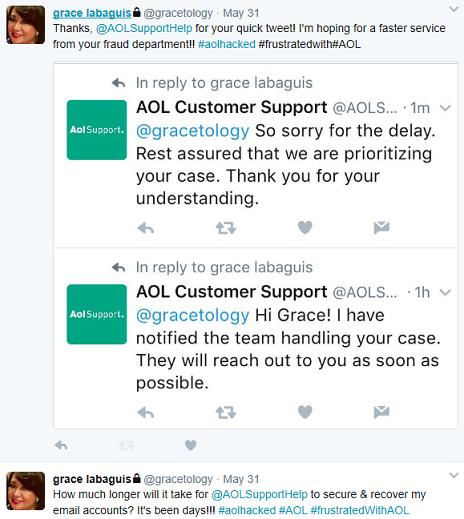Grace Labaguis battles behemoth AOL on social media over identity hack

‘Change passwords as often as possible and don’t store credit card information online.’ Photo by Jen Furer
It was a pleasant Memorial Day afternoon, and Grace Labaguis of Jersey City was out shopping with her son. When they got home in the evening, she received a voicemail alert from Western Union (WU), asking to confirm transactions she made online.
Strange, because she never made any remittance. She had just returned from the Philippines for her father’s interment so there was no reason to send money to her family right away. Little did she know that in the time that she was hopping from store to store, hackers had taken possession of her WU account and made off with thousands of dollars.
“I got nervous,” said Grace, an entrepreneur and a finance-savvy marketing executive.
She promptly checked her bank and saw four WU transactions each in increments of $1,000 went through. She called WU to put a stop to the remittances because she did not make them. WU said it could not do anything because all the information checked out so the transactions went through. WU gave her a case number that she could provide to the police and the bank for their investigation.
She tried logging on to her AOL account and could not get in despite attempts to change password. Her security questions were not being accepted. It was becoming clear: She’s been hacked!
She also received a call from Xoom.com, verifying a transaction she never made. They were fast in alerting her, so that fraudulent attempt was prevented. Next, the hacker tried to get into her Facebook account! She received a notification so she was able to secure her account.
By this time, Grace was a bundle of emotions — exhausted from shopping, confused by the unauthorized remittances, angry at AOL for not helping sort out her compromised account.
“I kept calling AOL. They said they couldn’t help me. Pikon na talaga ako,” she told The FilAm. “I told them you’re protecting the hacker and not the owner.”
Grace filed a police report. The Jersey City police came to her house. They said they could investigate only after a crime has been committed. After a fifth attempt by the hackers to get more money was completed, the cops made their move and Grace shared all information about the incident, providing the WU case number.
Confronted by a footdragging AOL, she went on Twitter and began to share her nerve-wracking experience. Online, she found comfort in a community of disgruntled AOL users.
AOL responded quickly, declaring her case a priority. AOL gave her a call. The cops advised her to verify it was truly AOL before sharing any information. Working with AOL, Grace was able to secure a new password which allowed her to log in again after several days of inactivity. The unopened emails provided answers to some of her questions: One hacker has a Makati City location, another is from Bangkok. She harvested their IP addresses and provided them to authorities.
Will she get her money back? The refund process is ongoing but she’s been assured her money will be returned.
Will she keep her AOL account? Until the case is finally closed, yes.
Will she continue to send remittances online? She will be sending money through banks from now on.
What did she learn? Change passwords as frequently as possible and include a second-step verification is important. Do not store credit card information or personal information in any online sites. Always think before clicking any link.
She said, “I wanted to share this experience to help people be aware of Internet fraud.”
Copyright (C) 2017 The FilAm












